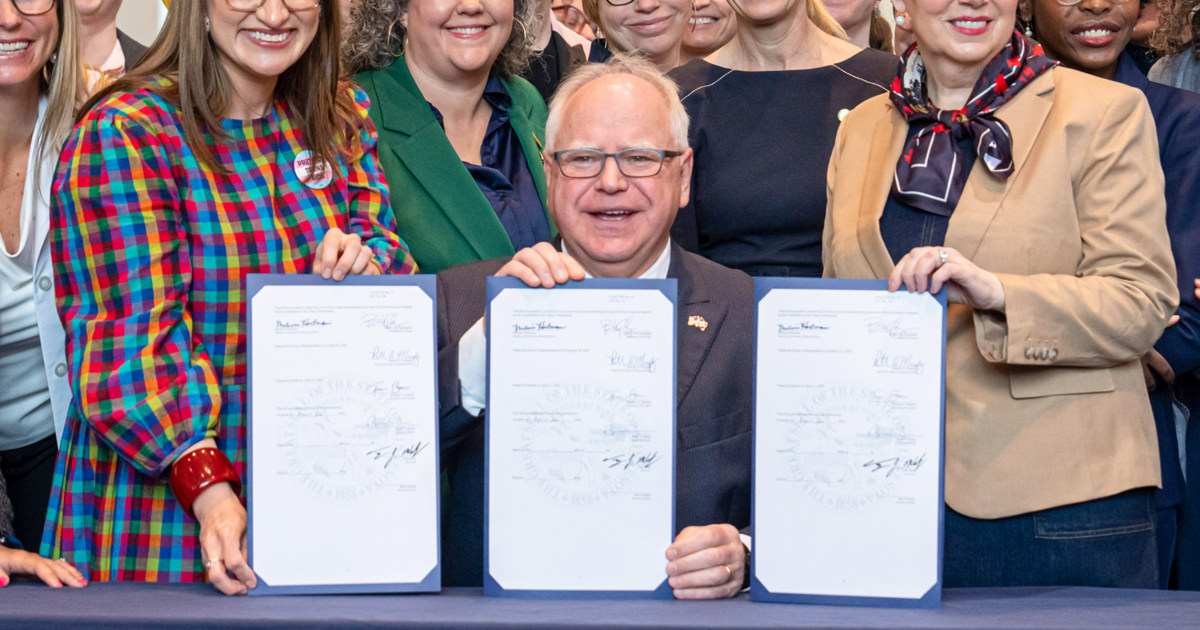
Months before he was selected as Vice President Kamala Harris’ running mate, Minnesota Gov. Tim Walz toured a Planned Parenthood clinic in his state alongside Harris — the first time a sitting president or vice president had visited an abortion provider.
That visit in March put Minnesota’s efforts to safeguard reproductive rights in the spotlight.
Now, Harris and Walz represent a Democratic ticket that vocally supports access to abortion and fertility treatment, during an election in which those issues are expected to be important to voters and a focus of many Democratic campaigns.
Minnesota was the first state to pass a law protecting abortion rights after the Supreme Court’s Dobbs decision in 2022. The law, which Walz signed in January 2023, stipulates that local governments — cities, counties, towns, etc. — cannot regulate a person’s choice to obtain an abortion or other reproductive services.
A few months later, Walz signed a second abortion-rights law — that statute prohibits the arrest of abortion providers in Minnesota and protects people who travel there to avoid another state’s abortion ban. According to the law, Minnesota officials do not have to turn over a patient’s health records in response to another state’s subpoena or court order.
The share of people who traveled from other states to Minnesota for abortions tripled between 2020 and 2023, according to data from the Guttmacher Institute, a research organization that supports abortion access.
Abortion-rights advocates pointed to these actions when expressing support for Walz on Tuesday.
“By choosing Gov. Walz as her running mate, Vice President Harris has put forward the most pro-reproductive freedom ticket in history,” Alexis McGill Johnson, president and CEO of Planned Parenthood Action Fund, said in a statement. “Gov. Walz is a longtime champion of sexual and reproductive health care and has been a fierce abortion rights champion as governor.”
Minnesota, which traditionally votes for Democratic presidential candidates, has some of the most progressive abortion policies in the country. Abortion has been legal there since the Roe decision in 1974. In 1995, the Minnesota Supreme Court ruled that abortion rights were protected by the state’s constitution.
Since Roe was overturned, the state has adopted additional measures to make abortions easier to obtain. In July 2022, a district court judge struck down several requirements that hindered access, including a rule that only physicians could perform abortions and a mandatory 24-hour waiting period. Abortions are also covered by state Medicaid funds.
As governor, Walz also slashed funding for a grant program under the Minnesota Department of Health that supported so-called crisis pregnancy centers, which offer pregnant people counseling and supplies while often trying to persuade them not to get abortions. Some of these centers have been known to provide inaccurate or misleading information.
National Right to Life, the largest anti-abortion organization in the U.S., said Tuesday that Walz’s move to defund crisis pregnancy centers in his state was a “huge blow” to families.
“If elected, a Harris-Walz Administration would push for the most extreme abortion agenda policies of any administration,” Carol Tobias, president of National Right to Life, said in a statement.
In addition to his support for abortion access, Walz has championed in vitro fertilization. Many abortion rights supporters worry that access to the fertility treatment is under threat post-Dobbs, since IVF often involves discarding embryos due to genetic abnormalities or because they are no longer needed. Some who believe in the notion of fetal personhood have opposed that practice. National Right to Life, for instance, says frozen embryos should be given to other couples rather than destroyed.
Walz told the Minneapolis Star Tribune in March that his two children were born with the help of fertility treatments, which his wife had been receiving for seven years before getting pregnant with their daughter.
In February, Walz criticized an Alabama Supreme Court ruling that said embryos created through IVF were considered children, meaning people could theoretically be sued for destroying them. The ruling prompted several IVF providers in Alabama to pause their services; they resumed once the state passed legal protections for fertility doctors and clinics.
“This issue is deeply personal to our family and so many others,” Walz wrote on Facebook at the time. “Don’t let these guys get away with this by telling you they support IVF when their handpicked judges oppose it. Actions speak louder than words, and their actions are clear.”
Walz has also expressed support for a bill introduced last year in the Minnesota House of Representatives that would require Minnesota health plans that offer maternity coverage to also cover fertility treatment. He has also called for language to be added to the Minnesota abortion-rights law signed in January 2023 that would further guarantee access to IVF and other fertility treatments.
Walz’s office did not respond to a request for comment. A representative for the Harris campaign said that restoring the protections that Roe afforded “is the position of the ticket.”






